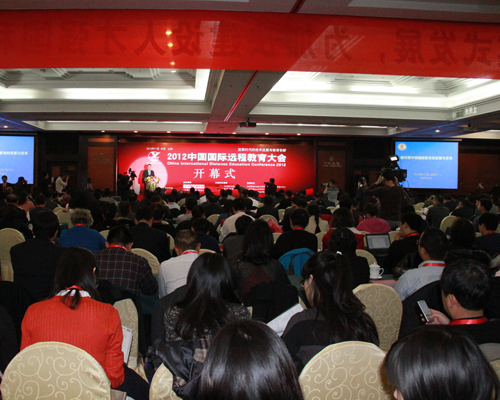
On November 22, the China International Distance Education Conference 2012 took place in Beijing. The conference, whose theme was “Technology Development and Education Innovation for a Changing World”, focused on the upcoming Third Industrial Revolution and discussed how to realize educational innovation in order to foster education equality, encourage the sharing of high quality educational resources, and build a learning-based society. This will ultimately quicken the pace of transformation from an emphasis on education quantity to quality in the light of new technology developments.

Liu Jiantong, deputy director-general of the Department of Vocational and Adult Education of the Ministry of Education (MoE); Liu Ying, director of the Division of Distance Education and Continuing Education of the MOE; Tang Min, counselor of the State Council and economist; Yang Zhijian, president of the Open University of China (OUC) and the China Association for Educational Technology; Ruan Zhiyong, Party secretary and vice president of the OUC; Yan Bing, vice president of the OUC; Zhang Hui, deputy Party secretary of the OUC; and Yang Zongkai, president of Central China Normal University, attended the conference.
In his keynote speech “On the New Developments and Innovations in Distance Education in China”, Liu Jiantong noted that the 18th CPC National Congress has placed a greater emphasis on the development of continuing education, the completion of the lifelong education system and the construction of a learning-based society. This has endowed continuing education with a more important historic responsibility and mission. Tang Min’s speech “Why China’s New Online Education may be Leading the World” put forth that in the latter stages of the Third Industrial Revolution, digitalization, new resources, and the Internet technology will produce new changes to the education industry. As a result, new education methods will be necessary to adapt to this new age. In his speech on “Adaptability of Choice and the Pursuit of Excellence”, Yang Zhijian maintained that cloud computing has become an inevitable economic trend that will have a major impact on society. In response to this trend, the OUC needs to stimulate educational informationization and update education methods with new technologies. Yang Zongkai’s speech “Technology: The Backbone of Education Innovation” touched on the advanced classroom, digital teachers and the future of education.
Tu Zipei, a leading Chinese information management expert living in America and author of The Big Data Revolution; Huang Bo, chairwoman of ChinaEDU Corporation; and Sun Chang, assistant vice president of New Oriental Education & Technology Group and director of Koolearn, also gave speeches on “Information Technology and the Education Revolution”, “An Exploration of Online Innovative Talent Training”, and “Learning Anywhere, Anytime” respectively.
The conference incorporated a number of other events, including the Forum for the Deans of Online Colleges, The OUC Construction Forum, Enterprise e-Learning Practice Forum, Forum on the Construction and Development of Corporate Universities, Forum on Mobile Learning and the Application of New Products, Forum on the Innovative Development of Regional RTVUs, and a Round-Table on Distance Education in Western China.
The conference is held under the guidance of the National Higher Distance Education Cooperative Group and the OUC, and organized by Distance Education in China. Nearly 1,500 people from 500 institutions participated in the conference, including the leaders in charge of nationwide online learning, the directors of online and continuing education colleges, staff from the OUC, RTVUs at provincial- and prefecture-levels, the presidents of domestic and international corporate universities, the leaders of training departments at large enterprises and foreign and domestic educational training institutions. These institutions showed off the latest products and technological achievements.
By He Jing, the OUC